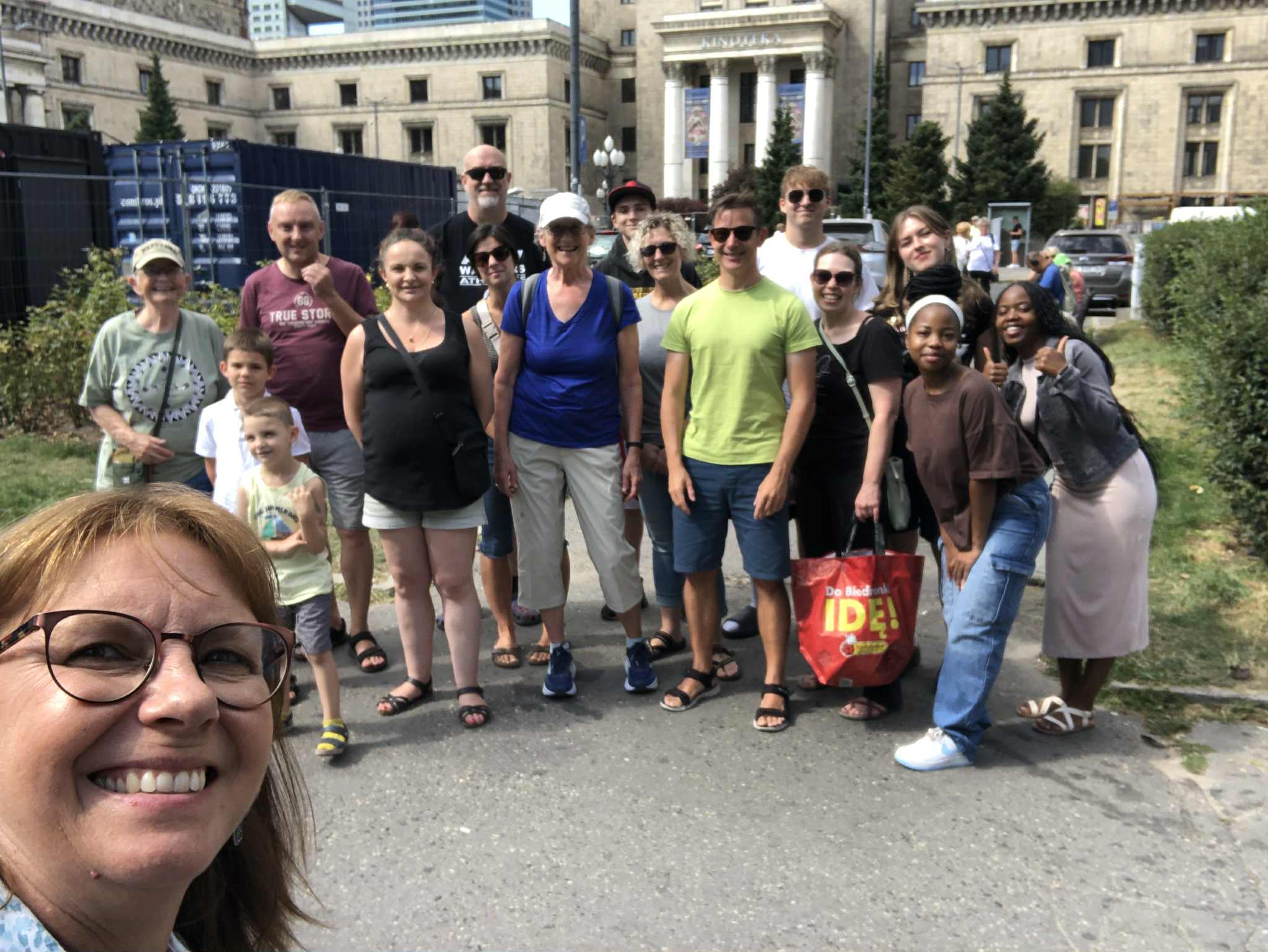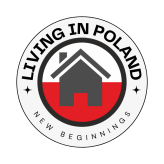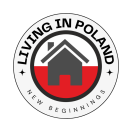Meet Our First Pierogi Person: Caleigh Furlong

To launch this series, Pierogi People (PP) sat down with our very first Pierogi Person, Caleigh Furlong (CF), at one of our favourite wine bars in Warsaw — Niewinność (Zgoda 5).
Caleigh is a teacher at the Thames British School in Warsaw, with more than a decade of experience in international schools across the city. Beyond the classroom, she wears another hat — as President of Smile Warsaw, the organisation that feeds people experiencing homelessness every Sunday at 13:30 (volunteers always welcome — come hungry to help, not to eat!). The group also provides clothing and, occasionally, free haircuts.
Caleigh first arrived in Warsaw in 2013, intending to stay a while, travel Europe, and then… who knows? Twelve years later, she’s still here, teaching, travelling, and helping to make Warsaw a kinder, more connected city.
So let’s find out what brought her to Poland, what surprised her most, and how she’s been living her best Warsaw life since 2013!
PP: Let’s get into it! Hi — who are you?
CF: I’m Caleigh (pronounced Kelly) Furlong. I’m from Benicia, California.
PP: Is that where you were born and grew up?
CF: No, I was born in Schenectady, NY. My parents were quasi-hippies and both teachers, so we moved a lot. People often asked if I was a military brat, but no — I was just the daughter of hippies!
After New York, we moved to Maryland outside Washington, DC, where my parents taught for a couple of years. Then they became volunteer teachers at a Catholic Mission School in Porcupine, South Dakota, on the Pine Ridge Reservation. In 1970, we moved to Pine Ridge, where we stayed until 1978. Then my dad decided to go back to school to get his master’s degree in Native American history.
So, we moved to Norman, Oklahoma, home of the University of Oklahoma. We lived there until the mid-1980s, when we moved to Benicia, California.
PP: So how old were you when you moved to California?
CF: I was 19. My parents had left a year earlier. I stayed in Oklahoma for a year before joining them in California.
PP: OK, but this interview is more about Poland than California or New York, so let’s jump ahead.
CF: Sure — I was in California when I decided to move to Poland.
Korea Before Poland
PP: But first you went to Korea?
CF: Yes. I took a teaching job in South Korea for about a year and a half, and I loved it. When my contract ended, I moved back to California for about six months. But I quickly realised I didn’t want to stay. I wanted to go abroad again.
PP: To see the world.
CF: Exactly. So, I started looking for jobs in Europe, since I’d already been in Asia.
PP: Did you already have Poland in mind?
CF: No, not at all. At first I looked at Italy, France, Germany — but those schools wanted EU teachers. Around 2012–2013, a lot of former Eastern Bloc countries were heavily recruiting Americans: Hungary, Czechia, Poland, Slovakia, Slovenia. I found a job online at the International Trilingual School of Warsaw.
The offer was attractive: a decent salary, an apartment, and they paid for my flight. That’s what got me here.
First Impressions
PP: What were your expectations before moving?
CF: Honestly, I wasn’t sure. I didn’t do any research because I didn’t want preconceived ideas — same as when I went to Korea. From history books, all I knew was that Poland was grey, snowy, and had a connection to WWII. That was it.
PP: So what was it like when you landed?
CF: For the first couple of days, it did feel grey. My supervisor picked me up at the airport and took me to my flat. I had no idea what to expect.
For example, in Korea I had to manually turn on the gas for my stove, so one of my first questions here was whether I had to do the same. My supervisor was a bit insulted — “Kelly, no, this is Poland!” — but I was just trying to learn what was normal here.
PP: Do you remember a funny story from those first days?
CF: Oh yes. On my first full day I went to a small Biedronka. I needed coffee and milk, so I grabbed a carton with a cow on it — looked perfect. I was so proud of myself at the register. Got home, poured it in, and realised it was maślanka (buttermilk). I just thought: “Oh no, what have I done?!” (All this while jetlagged!)
PP: How long before you started working?
CF: About five days. I wasn’t even over jet lag yet before I was in the classroom.
Teaching in Warsaw
PP: What was your first role here?
CF: I was hired to teach kindergarten and nursery. That wasn’t exactly my background, but I had done it in Korea, and I already had about ten years’ teaching experience by then. They might have been a little desperate, but hey — they hired me.
PP: And that was in 2013?
CF: Yes — August 13, 2013. More than 12 years ago now!
Changes in Warsaw
PP: How has Warsaw changed since you arrived?
CF: It’s exploded — construction everywhere, so many more businesses, and many more English speakers in shops. Another thing: back in 2013, it was rare to see people of colour here. Coming from the San Francisco Bay Area, that was very noticeable. Now Warsaw feels much more international and diverse.
Why Poland?
PP: Why have you stayed?
CF: Mainly the cost of living — it allows me to pursue my passion, which is travel. The job was just the way to make that possible. I wanted to be based in Europe, and Poland made that happen.
PP: And has it worked out?
CF: Beautifully. Travel within Europe has only become easier. When I first moved here, there were fewer flight options. Now, Warsaw is a great base.
PP: Did that surprise you?
CF: Yes — pleasantly!
Life in Poland
PP: Do you like it here? Would you recommend Poland?
CF: Absolutely. Warsaw is a fabulous city — international, vibrant, something for everyone. Poland as a whole is lovely and the people are wonderful.
PP: What do you do outside of work?
CF: I have a social life — I go to a local wine bar where everybody knows my name. But I also run a nonprofit called Smile Warsaw, where I’m the president.
PP: Tell us about Smile Warsaw.
CF: It’s a charity that offers a meal every Sunday to people experiencing homelessness in Warsaw. We usually serve 100–140 people, and also offer haircuts and other support. It started about seven years ago with expats handing out food from a car trunk. Now we’re an official NGO with schools, embassies, and volunteers involved. Anyone can come help — even just once.
PP: How is it viewed locally?
CF: We don’t hear much from the government, but our guests really appreciate it. Some have been coming for years. At Christmas and Easter, we also hand out gift bags.
Reflections
PP: Do you feel safe as a single female expat in Poland?
CF: Yes, very safe. Even walking home late at night. Meeting people takes effort — you have to be proactive, join groups, go out. But that’s true anywhere.
PP: Biggest challenges for newcomers?
CF: The language, for sure. Bureaucracy too, but honestly that’s the same everywhere. Also, customer service here is very different — not really a “thing.” It can be a shock if you’re used to American-style service.
PP: Favourite Polish food?
CF: I love żurek, chłodnik, and kotlet schabowy. Pierogi doesn’t always agree with me!
PP: Any recommendations for places to visit?
CF: Yes sure! There are the normal favourites such as Krakow and Wroclaw. Then there are some lesser known places that I love such as Frombork, Kolobrzeg and, perhaps my favourite, Zamosc!
PP: Any final advice for people considering a move?
CF: Yes — just do it! Don’t overthink it. Come, experience it, Poland is a great country and the Polish people are wonderful too.

